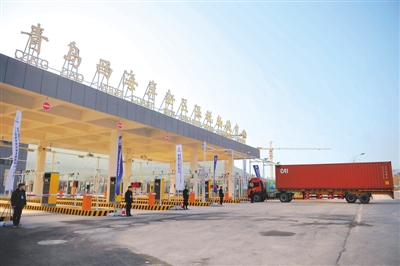Cross-border e-commerce welcomes development opportunities again
Open environment, breaking waves, legal policy escort
Cross-border e-commerce welcomes development opportunities again

A container truck loaded with goods is waiting for customs clearance at the Bonded Logistics Center (Type B) in the West Coast New District of Qingdao, Shandong Province. Photo of the Moon (People’s Picture)
Near the Spring Festival, e-commerce "New Year Festival" is full of tricks, and cross-border e-commerce is becoming more and more busy. In recent years, China has become the largest and fastest-growing cross-border e-commerce market in the world. Consumers can easily "buy globally" and enjoy high-quality products from all over the world without leaving home. With China’s opening wider and wider, relevant departments have successively issued substantial favorable policies, and with the escort of the Electronic Commerce Law, cross-border e-commerce is expected to enter a new period of healthy and rapid development.
The market potential is growing.
The strength of cross-border e-commerce has further enhanced the internationalization of double 11. According to the data of the Ministry of Commerce, from November 1 to 11, 2018, the sales of cross-border e-commerce imported goods exceeded 30 billion yuan, and a well-known domestic e-commerce platform introduced nearly 19,000 overseas brand goods from 75 countries and regions to participate in the promotion.
The huge capacity of the domestic demand market and the development of the Internet have enabled domestic consumers to gradually develop the habit of "Haitao" through cross-border e-commerce. Many heads of multinational companies said that with the improvement of China residents’ income level and the change of consumption concept, the potential of China market will only grow.
According to the statistics of E-commerce Research Center, in the first half of 2018, the scale of cross-border e-commerce import transactions in China reached 1.03 trillion yuan, a year-on-year increase of 19.4%. By the end of June 2018, there were 75 million users who regularly conducted cross-border online shopping in China.
The development of cross-border e-commerce has also brought new business models and new operating systems for the operation, management and service of the entire logistics system. In this regard, international logistics companies feel particularly deeply. Chen Wenhong, managing director of FedEx China Marketing Department, said earlier that in recent years, the growth rate of China’s imports is much higher than that of its exports in both B2B (business-to-business) and B2C (business-to-customer) fields, making it the fastest growing market for cross-border e-commerce in the world.
A series of timely and effective reform measures have also promoted the growth of cross-border e-commerce. For example, the the State Council executive meeting held in November 2018 decided to continue and improve cross-border electronic commerce’s retail import policy and expand its scope of application, so as to stimulate consumption potential.
E-commerce platform seizes opportunities
With the increasingly important role of cross-border e-commerce in China’s foreign trade, major e-commerce companies also seize the opportunity to compete for layout. During the China International Import Expo held last year, Ali, Suning, JD.COM and other e-commerce platforms announced their import plans one after another, and took the opportunity to purchase goods and explore sources of goods. Among them, Suning has released a three-year global procurement plan of 10 billion euros, and will conduct large-scale procurement on a global scale. More than half of the procurement amount will be used for high-quality lifestyle products such as home appliances, mothers and babies, and supermarket beauty department stores.
At the same time, the vigorous development of cross-border e-commerce in China has also provided overseas businesses with new channels to enter the China market. Many internationally renowned brands regard cross-border e-commerce enterprises in China as their preferred trading partners in China. Experts said that China consumers’ import consumption has gradually become normal, and the imported consumer groups are younger, which provide a solid foundation and new opportunities for the faster development of cross-border e-commerce in China.
It is not only e-commerce companies that seize opportunities, but also local governments. In July 2018, the State Council agreed to establish cross-border electronic commerce Comprehensive Experimental Zone in 22 cities including Beijing, Hohhot and Shenyang, and actively deepen the "streamline administration, delegate power, strengthen regulation and improve services" reform in foreign trade. As of 2018, the number of cross-border e-commerce comprehensive experimental zones in China has reached 35. Relevant reform measures have been introduced in many pilot areas to realize the liberalization, facilitation and standardized development of cross-border electronic commerce.
Industry insiders predict that the central and western regions will become the development focus of cross-border e-commerce in the future, and the "Belt and Road" countries will be the focus of cross-border e-commerce development and open a new channel for supply-side reform.
Favorable policies encourage development
With the implementation of favorable policies related to cross-border e-commerce, the development of cross-border e-commerce in China is expected to enter a "golden age". The E-commerce Law, which has been implemented since New Year’s Day this year, clearly states that the state promotes the development of cross-border electronic commerce, establishes and improves the management systems of customs, taxation, entry-exit inspection and quarantine, payment and settlement, etc., which are adapted to the characteristics of cross-border electronic commerce, improves the facilitation level of all links in cross-border electronic commerce, and supports cross-border electronic commerce platform operators to provide cross-border electronic commerce with warehousing, logistics, customs declaration, inspection and other services.
At the executive meeting of the State Council held at the end of 2018, it was pointed out that on the basis of zero tariff within the limit for the goods in the cross-border e-commerce retail import list, and the import value-added tax and consumption tax are levied at 70% of the statutory taxable amount, the scope of goods enjoying preferential policies will be further expanded, and 63 tax items with large demand from the public will be added. In addition, the Ministry of Finance, the General Administration of Customs and the State Administration of Taxation jointly issued a notice saying that the tax policy for cross-border e-commerce retail imports will be adjusted, the upper limit of commodity quotas enjoying preferential tax policies will be raised, and the scope of the list will be expanded. The notice will be implemented as of January 1, 2019.
Experts pointed out that these measures will accelerate the development of new formats and new models such as cross-border e-commerce, help improve the level of openness, promote the steady growth of foreign trade import and export and new kinetic energy growth, and increase consumption and employment.
While encouraging and guiding development, we should also strengthen the supervision of cross-border e-commerce. According to the statistics of the State Administration of Market Supervision, in recent years, complaints and reports involving cross-border e-commerce have been on the rise, with milk powder, food, diapers, health care products and cosmetics having the highest number of complaints. How to make consumers feel at ease is a question that cross-border e-commerce must answer.
In this regard, the e-commerce law makes it clear that e-commerce operators engaged in cross-border electronic commerce should abide by the laws and administrative regulations on import and export supervision and management. The the State Council executive meeting also made it clear that the responsibilities of cross-border e-commerce enterprises, platforms, payment and logistics service providers will be strengthened in accordance with the principle of inclusive and prudent supervision, and the quality and safety monitoring and risk prevention and control of commodities will be strengthened. (Reporter Liu Wei)

